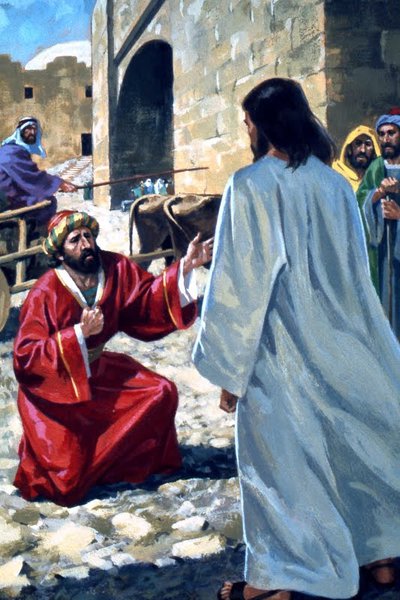Thoughts for the Day
Monday, 31st March 2025: The nobleman's son
Herod Antipas Jairus John 4 Jesus Healing
Reading : Verses from John, Chapter 4

Then he came again to Cana in Galilee where he had changed the water into wine. Now there was a royal official whose son lay ill in Capernaum. When he heard that Jesus had come from Judea to Galilee, he went and begged him to come down and heal his son, for he was at the point of death. Then Jesus said to him, ‘Unless you see signs and wonders you will not believe.’ The official said to him, ‘Sir, come down before my little boy dies.’ Jesus said to him, ‘Go; your son will live.’ The man believed the word that Jesus spoke to him and started on his way. As he was going down, his slaves met him and told him that his child was alive. So he asked them the hour when he began to recover, and they said to him, ‘Yesterday at one in the afternoon the fever left him.’ The father realized that this was the hour when Jesus had said to him, ‘Your son will live.’ So he himself believed, along with his whole household. Now this was the second sign that Jesus did after coming from Judea to Galilee.
(Lectionary, New Revised Standard Version)
Thoughts
In today's reading we find Jesus returning to Cana in Galilee where he has previously turned water into wine at a wedding. The news has spread and people gather wondering if they will see another miracle. They come from all around including from Capernaum, Jesus' adopted home town. Among them is a royal official, presumably from Herod Antipas' court, for he ruled Galilee at this time, and he comes to ask Jesus to heal his son who is dying.
Jesus has just accused the people of coming to see him perform "signs and wonders", like some magician. When the nobleman asks for help, he expects Jesus to attend his house to heal the child, but Jesus only says "Go; for your son will live." The test of faith for the man is severe. His son is dying, can he trust Jesus's words? But we are told that he simply believes. He needs no other proof, but goes home where he is met by good news. This story ranks alongside that of the healing of Jairus' daughter, and the healing of the woman with an issue of blood (Luke 8.40-56). In each case their faith is unwavering. Jairus does not doubt that Jesus can heal his daughter even though she is believed to have died; the woman in the crowd firmly believes that if she touches the hem of Jesus' cloak she will be healed; and the "royal official", as we have seen believes that the power of Jesus transcends distance and his son will be healed.
This story should act as a model for Christians today, urging us to rely on God’s promises even when circumstances seem dire. Today's world wants tangible evidence, proof for everything, but these stories all underline the need for faith first. Just as the nobleman’s faith led to his son’s healing, our faith can also pave the way for healing, whether that is physical, mental, or spiritual healing. We need to learn to have complete faith that our Saviour, Jesus, can and does intervene in our lives when we ask for His help.
Prayer
Lord Jesus Christ,
give us faith enough to "move mountains",
but also give us understanding as to
what we should request.
May our appeals match Your desires,
and our entreaties be selfless.
Keep us ever praying for Your world,
for Your church,
for Your people,
and commending ourselves to You.
Amen.
You might like to read this:
or these: